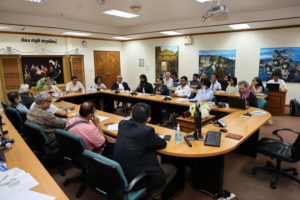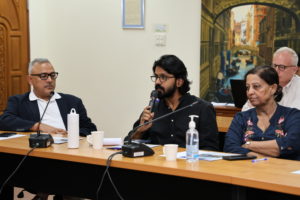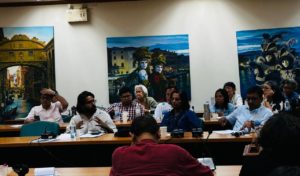Written by Aravind Unni, Asia Program Officer, HIC – WPC
Introduction
The Asia Pacific Social Forum (APSF) is an essential platform for civil society organizations (CSOs), people’s movements, and activists across the region to unite in their struggle for a just and equitable world. From 30-31 August 2024 Habitat International Coalition (HIC) & the Working People’s Coalition (WPC) joined an in-person APSF planning meeting in Burapha University, Bangasen, Thailand. The gathering was dedicated to continuing the momentum built during the World Social Forum (WSF) 2024 in Nepal as well as preceding efforts to revitalize the World Social Forum process in the Asia Pacific region that has been in progress since 2022. The meeting presented a crucial opportunity to strengthen regional solidarity and continue fighting systemic inequality, war, and oppression.
The ongoing APSF process began with an online gathering in February 2022, which saw the participation of over 200 CSOs from across the region, highlighting the urgency to combat authoritarianism, war, conflict, deep inequalities, climate crises, and the need for decent habitat and livelihoods. Following this, a series of meetings in Bangsaen and Bangkok in 2022 and 2023 further emphasized the importance of strengthening the Social Forum process in Asia Pacific. The success of WSF 2024 in Nepal, which reinforced the collective effectiveness of regional forums, paved the way for ongoing initiatives.
This APSF meeting in August 2024 brought together over 40 representatives from over 10 different countries of networks, movements, and organizations from across the region. Participants discussed the current situation in Asia, reviewed the progress of the APSF process, and strategized for the future, including preparations for the World Social Forum in Benin in 2026. The meeting concluded on a positive note, with a strong reaffirmation of the commitment to the WSF’s Charter of Principles and a shared dedication to building a just, sustainable, and equitable world.
The Meeting & Key discussions
To build momentum from WSF 2024 Kathmandu and prepare for the 2026 WSF in Benin, discussions focused on bridging the gap between Asia and Africa, with a thematic forum and gathering. There is a recognition that Asia needs to enhance its mobilization efforts, as many social movements in Asia are not yet part of the WSF process. A campaign is proposed to create a symbolic connection between Kathmandu and Cotonou, serving as a slogan to unite these efforts. Given funding constraints, an alternative meeting location in Egypt or Lagos, Nigeria, is suggested to facilitate discussions between African and Asian movements. This meeting should go beyond being a mere event, offering a platform to explore the processes and politics relevant to African and Asian issues. Additionally, a meeting with African social movement activists is proposed to coincide with the Fight Inequality Global Gathering in Manila from 4-7 September, where some of the current APSF participants will engage with each other and share these ideas.
 In terms of country processes, the India Social Forum Process is set to take place in three states—Maharashtra, Haryana, and Jharkhand, with plans to expand to 10 states next year. Bangladesh is planning a cross-country forum involving Bangladesh, India, Nepal, and Bhutan, to be held either in Nepal or another country, potentially by the end of this year or early next year. In the Philippines, a letter has been sent to social movement groups to encourage participation in the ASEAN forum. Cambodia volunteered and said that they will focus on mobilizing local organizations and widely disseminating information about the APSF in the coming months. In Nepal, as part of WSF 2024, a grassroots-level, nationwide process will be organized to engage participants who missed the event.
In terms of country processes, the India Social Forum Process is set to take place in three states—Maharashtra, Haryana, and Jharkhand, with plans to expand to 10 states next year. Bangladesh is planning a cross-country forum involving Bangladesh, India, Nepal, and Bhutan, to be held either in Nepal or another country, potentially by the end of this year or early next year. In the Philippines, a letter has been sent to social movement groups to encourage participation in the ASEAN forum. Cambodia volunteered and said that they will focus on mobilizing local organizations and widely disseminating information about the APSF in the coming months. In Nepal, as part of WSF 2024, a grassroots-level, nationwide process will be organized to engage participants who missed the event.
Key decisions include holding a thematic forum in March 2025 in a hybrid mode, though the location is yet to be determined. The Asia Pacific Social Forum is scheduled for October 2025. Thematic spaces have been activated, and a working committee has been formed to support these initiatives.
The Experiences & Reflections
Reflecting on the recent Asia Pacific Social Forum (APSF) and its alignment with the World Social Forum (WSF), it becomes evident that both forums would benefit from a stronger thematic focus and especially a focus on housing and habitat, particularly in urban contexts. At present, habitat and sustainable development are part of the climate change thematic, which forms one of the 14 thematic of the WSF.
 While the broader macro-political discussions are crucial and provide a critical lens to build interregional solidarities, an opportunity exists for the forums to effectively use the thematic to connect with the lived realities of communities struggling with housing and habitat issues. There is a need to deepen this thematic perspective, ensuring that the critical challenges of housing and habitat are addressed with the urgency and attention they deserve. The APSF also intends to rejuvenate its thematic groups to bring together diverse communities and actors and facilitate inclusive dialogues and collaborations.
While the broader macro-political discussions are crucial and provide a critical lens to build interregional solidarities, an opportunity exists for the forums to effectively use the thematic to connect with the lived realities of communities struggling with housing and habitat issues. There is a need to deepen this thematic perspective, ensuring that the critical challenges of housing and habitat are addressed with the urgency and attention they deserve. The APSF also intends to rejuvenate its thematic groups to bring together diverse communities and actors and facilitate inclusive dialogues and collaborations.
 A positive development within APSF has been its effort to focus actions on democracy, peace – conflict, and climate change. This focus could be broadened by including issues like housing, habitat, and social security to ensure a holistic approach and ensure that APSF remains a platform for diverse voices and transformative ideas. Lastly, APSF discussions identified a critical need to increase youth participation in its exchanges, essential for the sustainability and dynamism of the forum.
A positive development within APSF has been its effort to focus actions on democracy, peace – conflict, and climate change. This focus could be broadened by including issues like housing, habitat, and social security to ensure a holistic approach and ensure that APSF remains a platform for diverse voices and transformative ideas. Lastly, APSF discussions identified a critical need to increase youth participation in its exchanges, essential for the sustainability and dynamism of the forum.
What’s next? Future Actions
Recognizing the need for a more focused approach, HIC – WPC along with STT from Cambodia have taken on the responsibility of revitalizing the thematic group on housing and habitat under the existing 14 themes of the WSF 2024 in Kathmandu. This commitment contributes to the thematic development but also to broaden the conversation around housing and habitat within the WSF and APSF processes.